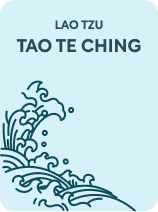

This article is an excerpt from the Shortform book guide to "Tao Te Ching" by Lao Tzu. Shortform has the world's best summaries and analyses of books you should be reading.
Like this article? Sign up for a free trial here .
What does it mean to take non-action? Why should you never try to force things to happen before the universe is ready?
An important lesson in the Tao Te Ching is practicing wu wei, or non-action. When we observe instead of act, it opens us up to a whole new world of possibilities. We must also learn to let go of ambition and the need for external validation because earthly pleasures only act as distractions from finding true fulfillment.
Keep reading to learn more about non-action in Taoism.
The Art of Non-Action
While we make things using tangible material, it’s often the intangible space within these entities that we use in our daily lives. For example, while a house is made from wood or brick, it’s the empty space on the inside that people utilize for living.
To create usable emptiness in your life, embrace non-action (also known as wu wei, or 无为), or the willingness to remove personal desire and act only when the time is right. This makes you a vessel for the universe to utilize for a greater purpose that you may not understand. Instead of trying to control the world around you, release yourself from the burden of ambition and allow the universe to guide your actions.
When you fully engage with the Tao, you become like a newborn child. The world is new and exciting, and your perspective doesn’t taint your experience. When all is new, you have no expectations and can never be disappointed. This will let you find peace with anything that arises, even death itself.
When you empty your mind of all earthly desires and let your heart be at peace, you can engage with the serenity offered by the Tao. However, if you refuse to allow the Tao to be your guiding force, you’ll find yourself lost and distraught. If you refuse to move with the universe and instead try to control the world around you, the universe will break you.
Let Go of Ambition
To embrace non-action, you must let go of ambition as it blinds you to your surroundings and causes you to act out of personal desire. Compare ambition to a loud noise. If all you can hear is that one loud noise, you’ll miss all of the small, more intricate noises surrounding you. Similarly, if you only focus on your ambition, you’ll miss the more intimate moments that are occurring right in front of you.
The Tao is available to every being in the universe because it attaches no ambition or desire to the energy it generates. Therefore, it has no ulterior motive behind the offering of its power and wisdom. Likewise, when you detach yourself from personal desire, you can selflessly offer your energy to the beings and things around you without limitation. This allows you to live harmoniously with your surroundings, feeling fulfillment while staying rooted in the Tao.
Remove yourself from earthly ambitions, avoiding selfish or manipulative behavior in the process. This will separate you from those who are too wrapped up in their own perspective to be guided by the world around them.
Avoid Excess and External Validation
To embrace non-action, you must also let go of the need for material excess and external validation. If you strive to meet society’s barometers for “success,” it’s easy to become consumed by your desire for status, causing you to make decisions that satiate this desire instead of waiting for the guidance of the Tao.
Society’s barometers for success often relate to wealth and power, both tempting forces. These forces lead to classist and violent societies, both of which run counter to the Tao. For example, if society values wealth, the desire to become wealthy can become greater than the desire to live harmoniously with your surroundings.
Furthermore, the concept of “chasing status” relies on the idea that you need “more” to be happy. The desire for more can destroy you, as obtaining it often requires that you ostracize the people around you. For example, if you chase after money, you may spend less time with your loved ones or friends in an effort to climb the corporate ladder.
Instead of trying to make the world bend to your desires, let go of the concept of “success” and remain internally focused. To eliminate your need for material excess and external validation:
- Take the time to understand your place in the universe instead of investing energy into the demands of others. Understanding others gives you knowledge, but understanding yourself gives you wisdom.
- Don’t dwell on the opinions of other people. Instead, focus on your own journey with the Tao, listening to the universe and engaging with the world as it comes to you.
- Do the earthly work the universe calls you to do, but then walk away from it. If you dwell on it, you’ll become a slave to excess or validation as you’ll become engrossed with the material rewards of your earthly work. When you realize that the universe has given you everything that you need, you’ll feel content.
Earthly pleasures and “success” may provide distraction through enjoyment, but the Tao, though seemingly mundane, provides true fulfillment.
Practice Patience
A final element of embracing non-action is being patient and allowing the Tao to guide your behavior. You can’t seek out the “right time” to act as this will inherently put your personal desires into your decisions.
Instead, you must wait for the moment to come to you, thus allowing you to interact with the world based on how it actually is instead of how you want it to be. If you’re searching for fulfillment in earthly desires, you’ll never be truly patient and observant because you’ll try to force things to happen before the universe is ready.
For example, if you want a promotion at work, you may try to take action to “prove yourself” to your boss. This action comes from a personal desire for external validation. While chasing this promotion, you’d likely become so focused on your task that you’d miss the opportunities that would’ve naturally arisen had you been patient enough to wait for the universe’s guidance.
Though you will spend most of your time waiting for the Tao’s guidance, when you do feel moved by the Tao, allow yourself to feel its impact completely. You may not fully understand why you’re feeling what you’re feeling, but this shouldn’t prevent you from fully embracing your emotions. For example, if you feel the sudden urge to cry, allow yourself to cry. If you feel the sudden urge to laugh, allow yourself to laugh.
This helps you accept what the universe gives you, even in moments of loss or sorrow. For example, if a loved one passes away, you may feel extreme sorrow. In that moment, allow yourself to grieve. However, once the emotion begins to fade, don’t allow yourself to hold on to it. Let it go and re-engage with the workings of the Tao.

———End of Preview———
Like what you just read? Read the rest of the world's best book summary and analysis of Lao Tzu's "Tao Te Ching" at Shortform .
Here's what you'll find in our full Tao Te Ching summary :
- What the natural order of the universe is
- How the "Great Mother" offers energy to all beings
- How you can achieve harmonious living






